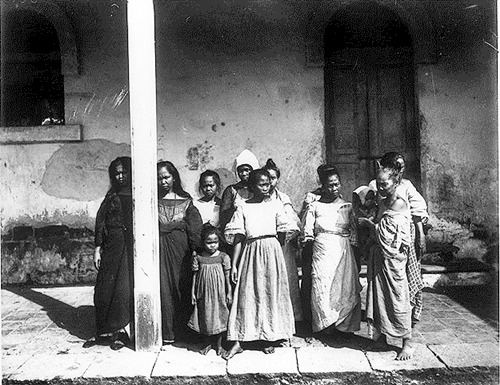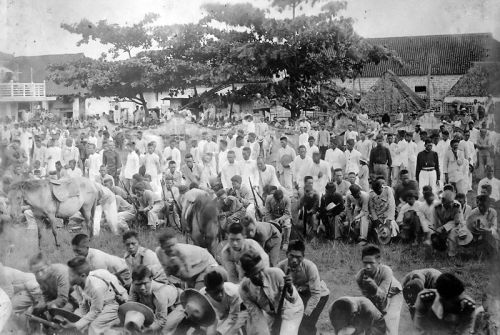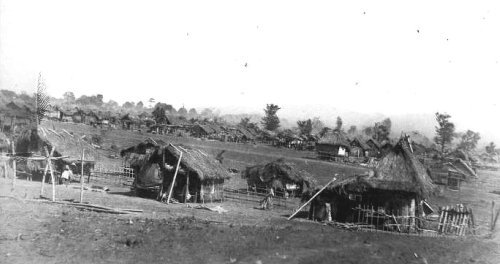manicpixiedreambakla:armaniwithoutthei:pinoy-culture:The Philippine-American WarThe Concentration Ca
manicpixiedreambakla:armaniwithoutthei:pinoy-culture:The Philippine-American WarThe Concentration Camps in the Philippines.One of the things and events not taught in history books and what has been sadly forgotten and neglected are the concentration camps in the Philippines created by the U.S.Major General J. Franklin Bell. was put in command in Batangas as another general, General Jake Smith, was already ravaging Samar and making it a “howling wilderness”, and already causing destruction and terror through a slaughter by ordering the “kill anything over ten”. By word and by deed, Bell made it clear that he was not going to be put in the shade by his brother officer when it came to slaughtering Filipinos. Even before he took command, Bell made his feelings known in unmistakable terms. “All consideration and regard for the inhabitants of this place cease from the day I become commander,” he said. “I have the force and authority to do whatever seems to me good and especially to humiliate all those in this Province who have any pride….”.Beginning in early December 1901 and continuing for the rest of the month, Bell issued a frightening series of orders. On December 8 he began setting up his concentration camps. The people of Batangas had two weeks in which to move into the garrisons. Everything lying outside the perimeter of the camps was subject to confiscation or destruction. Anyone found there would automatically be considered an “insurgent.” Neutrality was not to be entertained. Everyone “should either be an active friend or classified as an enemy.” How did one become an “active friend”? “The only acceptable and convincing evidence of the real sentiments of either individuals or town councils should be such acts publicly performed as must inevitably commit them irrevocably to the side of the Americans by arousing the animosity and opposition of the insurgent element.” How did one arouse the animosity and opposition of the “insurgent element”? By guiding troops to the camps of the enemy, by publicly identifying “insurgents,” by accompanying troops in operations against the guerrillas, by denouncing the “enemy” publicly, and by identifying secret guerrilla supporters. Suspicion of aiding the guerrillas in any way was sufficient cause for arrest without charge and incarceration for an indefinite period of time. “It is not necessary to wait for sufficient evidence to lead to a conviction by a court.General Bell ordered the entire population of the provinces of Batangas and Laguna to gather into small areas within the poblacion of their respective towns by Dec. 25, 1901. Barrio families had to bring clothes, food, and everything they could carry into the designated area. Everything left behind, houses, gardens, carts, poultry and animals, were burned by the U.S. Army. People found outside the concentration camps were shot.Bell’s subordinates were given the widest latitude: “Commanding officers are urged to use their discretion freely in adopting any or all measures of warfare….” The people of Batangas were to be made to “want peace and want it badly.” On December 13, Bell announced that the killing of American troops would be paid back in kind. Whenever such an event occurred, Bell proposed to select a prisoner “by lot from among the officers or prominent citizens” and have him executed. On December 15, Bell announced that “acts of hostility or sabotage” would result in the “starving of unarmed hostile belligerents.” The warning to Malvar was clear: he either had to give up the struggle or the “detainees” would face mass starvation. To show that he meant it, on December 20 Bell ordered all rice and other food lying outside the camps to be confiscated or destroyed. Wells were poisoned and all farm animals were slaughtered.January 1, it was announced, was the deadline for rendering “valuable service” to the Americans, and “those who have not fully complied with their duty” by that date were subject to prison. On the 24th, Bell admitted that the only course open to the Americans was”… to adopt a policy that will create in the minds of all the people a burning desire for the war to cease-a desire or longing so intense, so personal … and so real that it will impel them to devote themselves in earnest to bringing about a real state of peace, that will impel them to join hands with the Americans…” “These people need a thrashing,” Bell announced on the day after Christmas. ” … I have become convinced that within two months at the outside there will be no more insurrection in this brigade, and nothing for conspirators to negotiate about.” Since ” … practically the entire population has been hostile to us at heart … it is necessary to make the state of war as insupportable as possible, and there is no more efficacious way of accomplishing this than by keeping the minds of the people in such a state of anxiety and apprehension that living under such conditions will soon become unbearable.” Batangas, Bell concluded, will “be thoroughly sear~hed and devastated.Beginning January 1, 1901, as promised, Batangas was indeed thoroughly searched and devastated, as were the neighboring provinces. Bell assembled 2,500 men in columns of 50 and the hunt for Malvar was on. Expecting to destroy everything, Bell was at least as ruthless as Smith had been in the preceding extermination campaigns. The details of the concentration camp policy were, by now, depressingly familiar. Filipinos were rounded up and herded into detention camps where overcrowded conditions and lack of proper food and clothing resulted in the predictable spread of infectious diseases. Malaria, beriberi and dengue fever took their toll. One correspondent described the prisoners as ” a miserable-looking lot of little brown rats … utterly spiritless.”He also rounded up the wealthy and influential residents of Batangas. They were packed like sardines in small rooms, measuring 15-by-30-by-6 feet, into which up to 50 of them were crammed for months. They were pressed into work gangs to burn their own homes, until they agreed to aid American forces.Bell said, ”It is an inevitable consequence of war that the innocent must generally suffer with the guilty”. He reasoned that since all natives were treacherous, it was impossible to recognize “the actively bad from only the passively so.”In the “zone of death” outside the camp “dead line,” “all rendered themselves liable,” according to Bell. All property was destroyed, all houses put to the torch and the country was made a “desert waste … of death and desolation.” According to statistics compiled by U.S. Government officials, by the time Bell was finished at least 100,000 people had been killed or had died in Batangas alone as a direct result of the scorched-earth policies, and the enormous dent in the population of the province (which was reduced by a third) is reflected in the census figures. American policy was so brutal that even some of the U.S. government personnel became apprehensive. The American civil governor of Tayabas noted in his official report that killing, burning, torture and other harsh treatment was… sowing the seeds for a perpetual revolution. If these things need be done, they had best be done by native troops so that the people of the U.S.. will not be credited therewith.Starvation and disease took the lives of thousands. Between January and April of 1902, there were 8,350 deaths out of 298,000. Some camps lost as many as 20% of the population. There was one camp that was two miles by one mile (3.2 by 1.6 km) in area. It was “home” to some 8,000 Filipinos. Men were rounded up for questioning, tortured and summarily executed.Reverend W. H. Walker received a letter from his son and showed it to the Boston Journal, which reported about it on May 5, 1902. The letter described how 1,300 prisoners were executed over a few weeks. A Filipino priest heard their confessions for several days and then he was hanged in front of them. Twenty prisoners at a time were made to dig their mass graves and then were shot. The young Walker wrote, “To keep them prisoners would necessitate the placing of the soldiers on short rations if not starving them. There was nothing to do but kill them.”Sources: [x], [x]Wow. I never knew about this.White colonial education systems don’t want us to know about this =/and by “this” i mean the stories of our folks. -- source link
Tumblr Blog : pinoy-culture.tumblr.com
#history#philippines#concentration camps#war#genocide




